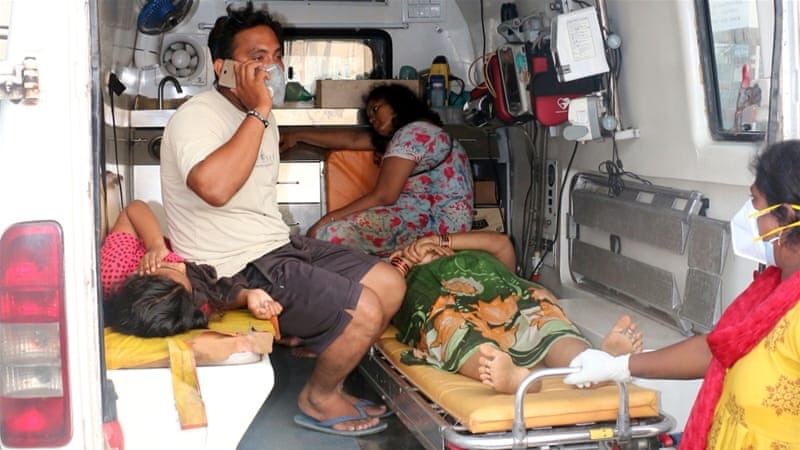
Indian protesters carry bodies into gas leak plant Toggle navigation
Crowd of about 300 people barges past police and security guards with bodies on stretchers, demanding plant’s closure.
10 May 2020
People affected by a gas leak at the LG Polymers Plant
are transported in an ambulance in Visakhapatnam on Thursday
Angry protesters carrying bodies
stormed an Indian chemical plant on Saturday to demand the facility’s closure after a toxic gas leak killed 12 people days earlier.
Thursday’s pre-dawn accident in the industrial port city of Visakhapatnam
injured hundreds and knocked many unconscious as they tried to flee the area.
India schoolgirls ill after New Delhi gas leak
I survived the Bhopal gas tragedy
India navy officer dies in destroyer gas leak
State government officials
arrived to conduct a safety tour of the plant, owned by South Korea’s LG Chem, when a crowd of about 300 people barged past police and security guards.
Some helped cart stretchers bearing three victims of the disaster, their feet sticking out from under the black canvas covers that otherwise shrouded the bodies.
They chanted slogans demandingjustice
for the dead and the shutdown of the plant before they were pushed back by security.
“I saw people carrying their children on their shoulders looking for water. They could not move because of the gas, I thought they were dead,” said one man.
At least three children were among the dead and dozens remain in hospital.
Authorities
have started a manslaughter investigation over the leak and India’s environmental tribunal has already fined the company $6.2m as a preliminary punishment.
Police said
the plant had been left idle because of India’s nationwide coronavirus lockdown and suspect the leak was caused by gas left in a tanker that overheated.
LG Chem
confirmed the polystyrene plant was not operating at the time of the accident but insisted there were maintenance staff at the facility.
The disaster
has evoked memories of a major leak at a gas plant in the Indian city of Bhopal that killed at least 3,500 people in 1984.
News | Al Jazeera